About The Shoulder
The serene coastal setting of Spanish Fort, Alabama, is home to The Shoulder, a residential addiction treatment center with a history of helping people in Gulf Coast communities overcome substance use disorders (SUDs) for over 30 years. They offer a safe supportive place where adult men can work on recovery with quality affordable treatment rooted in Christian values.
Three-Pillar Approach to Getting Sober
Their treatment approach focuses on three pillars: learning how to live sober, following the 12 Steps and finding strength through faith. This approach is designed to give men the tools they need to turn their lives around. It’s not just about quitting drugs or alcohol. The goal is to create a new better way of living that sticks.
Taking Your First Steps at The Shoulder
Before starting treatment you’ll have an assessment to help figure out the right level of care for you. It’s an easy process, but there is a cost for the assessment.
Once the assessment is done there’s an initial payment to cover the first two weeks of treatment. After that the cost is based on what you can afford.
Men’s Residential and Transitional Programs
Everyone starts out here in the Low Intensity Residential program. While you’re in the program you’ll team up with counselors to create a personalized treatment plan. They help you work through your challenges at your pace, with the right tools in your hands.
You’ll have time to take part in equine therapy where working with horses helps build trust and confidence. On top of that, once a month you’ll participate in a recreational group where you can have some fun and pick up new skills that’ll help in your recovery.
After you complete the program you have the option to move to their transitional program, where you’ll have more independence. Whether you choose to do that or not, they have a great aftercare program where you can come back each week and meet with a support group.
The men’s program at The Shoulder offers a supportive structured path to recovery with personalized treatment and ongoing support. It could be a good option for building a new sober life.
Facility Overview
Latest Reviews
Rehab Score
Gallery
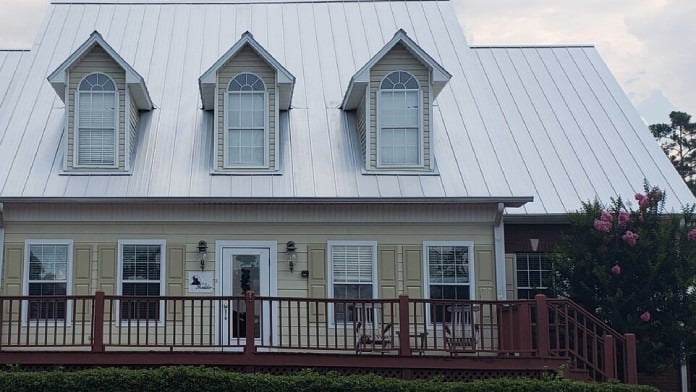
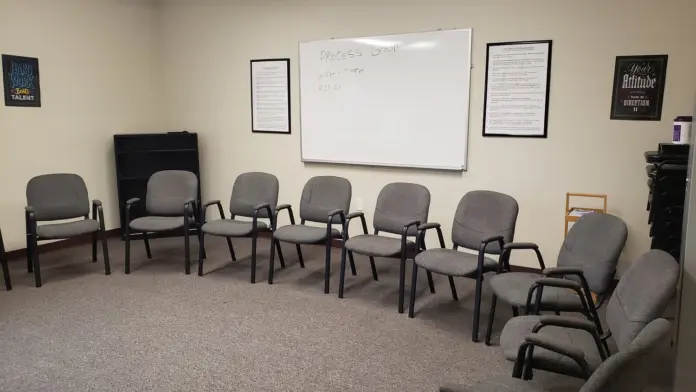
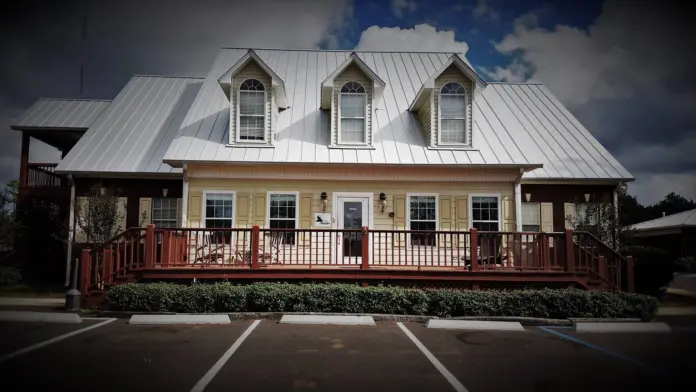
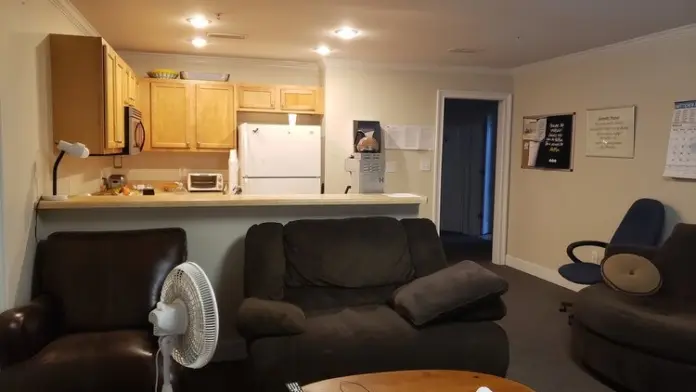
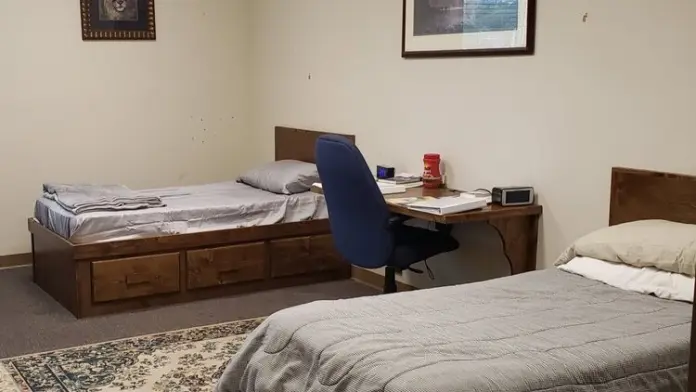
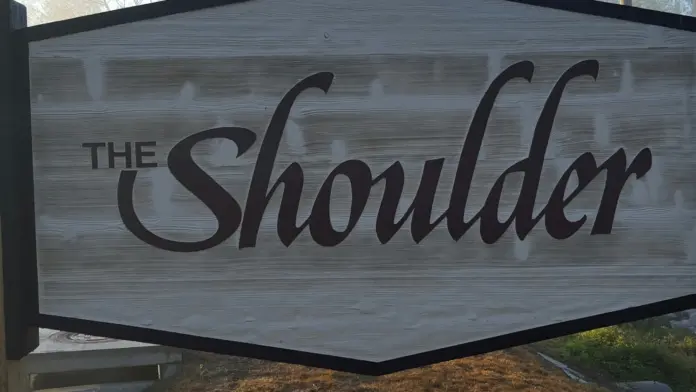
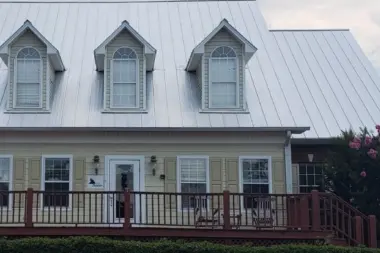
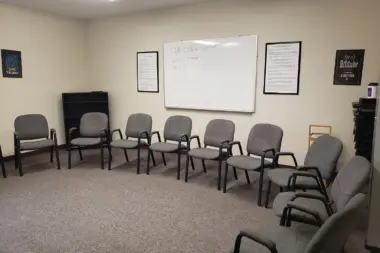


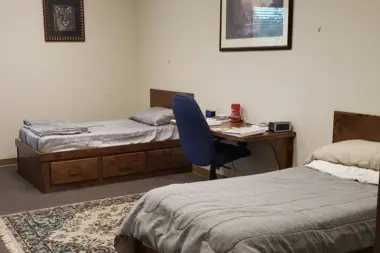

Other Forms of Payment
Private insurance refers to any kind of healthcare coverage that isn't from the state or federal government. This includes individual and family plans offered by an employer or purchased from the Insurance Marketplace. Every plan will have different requirements and out of pocket costs so be sure to get the full details before you start treatment.
Self-pay involves paying for treatment out of your own pocket. You can use savings or credit, get a personal loan, or receive help from family and friends to fund your treatment. If you don't have insurance or your insurance plan doesn't cover a specific program, self-pay can help ensure you still get the care you need.
Sliding scale payments are based on a client's income and family size. The goal is to make treatment affordable to everyone. By taking these factors into account, addiction recovery care providers help ensure that your treatment does not become a financial burden to you or your family, eliminating one barrier to care.
Addiction Treatments
Levels of Care
Outpatient Programs (OP) are for those seeking mental rehab or drug rehab, but who also stay at home every night. The main difference between outpatient treatment (OP) and intensive outpatient treatment (IOP) lies in the amount of hours the patient spends at the facility. Most of the time an outpatient program is designed for someone who has completed an inpatient stay and is looking to continue their growth in recovery. Outpatient is not meant to be the starting point, it is commonly referred to as aftercare.
Inpatient rehab is designed primarily for clients exiting detox, people in early recovery, and those at an elevated risk of relapse. Participants reside at the rehab facility until they complete their treatment program. This allows them to focus solely on their recovery, away from outside distractions, stressors, and addiction triggers. Inpatient drug rehab typically involves extensive addiction counseling, recovery-focused life skills training, and complementary therapies.
Intensive outpatient programs (IOP) are designed for clients in early recovery and those at an elevated risk of relapse. Clients in IOP attend outpatient therapy sessions for a minimum of nine hours per week but clients may receive as many as 20 hours of IOP treatment weekly. Sessions generally occur in 3-5 hour blocks, in which time clients engage in some combination of medication assisted treatment (MAT), psychotherapy, recovery skills training, or complementary care.
Rehab aftercare programs are designed to provide support to you after completing an addiction treatment program. These programs are highly customized and evolve with your changing needs. You'll partner with staff at the treatment center to identify any specific medical, behavioral, and social services needed to support your sustained sobriety. Aftercare services may include peer coaching, career counseling, and other personalized support.
12-step programs are addiction recovery models based on Alcoholics Anonymous (AA). A number of substance abuse programs (including some drug and alcohol rehab centers) use the 12 steps as a basis for treatment. Beginning steps involve admitting powerlessness over the addiction and creating a spiritual basis for recovery. Middle steps including making direct amends to those who've been hurt by the addiction, and the final step is to assist others in addiction recovery in the same way. 12-Step offshoots including Narcotics Anonymous (NA), Cocaine Anonymous (CA), Dual Recovery Anonymous (DRA), Sex and Love Addicts Anonymous (SLAA) and Gamblers Anonymous (GA).
At certain points in the recovery process, it's important to have medical support available around the clock, and 24-hour clinical care in Alabama offers a safe environment in which you can begin your recovery journey. This feature offers constant supervision in situations like medical detox, where a team of professionals are on hand to ensure the withdrawal processs is performed safely and comfortably.
Treatments
The goal of treatment for alcoholism is abstinence. Those with poor social support, poor motivation, or psychiatric disorders tend to relapse within a few years of treatment. For these people, success is measured by longer periods of abstinence, reduced use of alcohol, better health, and improved social functioning. Recovery and Maintenance are usually based on 12 step programs and AA meetings.
Drug rehab in Alabama provides medical or psychotherapeutic treatment for drug dependency. Methods of treatment often include a combination of medication, counseling, and recreational therapies.
A combined mental health and substance abuse rehab has the staff and resources available to handle individuals with both mental health and substance abuse issues. It can be challenging to determine where a specific symptom stems from (a mental health issue or an issue related to substance abuse), so mental health and substance abuse professionals are helpful in detangling symptoms and keeping treatment on track.
Opioid rehabs specialize in supporting those recovering from opioid addiction. They treat those suffering from addiction to illegal opioids like heroin, as well as prescription drugs like oxycodone. These centers typically combine both physical as well as mental and emotional support to help stop addiction. Physical support often includes medical detox and subsequent medical support (including medication), and mental support includes in-depth therapy to address the underlying causes of addiction.
You can find comprehensive substance abuse treatment in Alabama. Typically, drug and alcohol rehabs provide a full continuum of care including medically assisted detox, inpatient, outpatient, dual-diagnosis, and partial hospitalization. With a comprehensive substance abuse evaluation, addiction experts provide individualized treatment plans to cater to your individual needs. These programs address substance use disorders using evidence-based therapies like cognitive behavioral therapy (CBT) and dialectical behavioral therapy (DBT), counseling, and recovery support groups.
Programs
Adult rehab programs include therapies tailored to each client's specific needs, goals, and recovery progress. They are tailored to the specific challenges adult clients may face, including family and work pressures and commitments. From inpatient and residential treatment to various levels of outpatient services, there are many options available. Some facilities also help adults work through co-occurring conditions, like anxiety, that can accompany addiction.
Young adulthood can be an exciting, yet difficult, time of transition. Individuals in their late teens to mid-20s face unique stressors related to school, jobs, families, and social circles, which can lead to a rise in substance use. Rehab centers with dedicated young adult programs will include activities and amenities that cater to this age group, with an emphasis on specialized counseling, peer socialization, and ongoing aftercare.
Rehabs for women provide a safe, nurturing space for female clients to heal. These treatment programs consider the specific obstacles that women can face during recovery and place a special emphasis on mental, social, physical, and reproductive health. They explore how each woman's experience has shaped the trajectory of their substance use, addressing issues such as sexual abuse and past trauma.
Men face specific challenges and concerns when seeking addiction treatment. Gender-specific recovery programs help them tackle these issues head-on in an environment that's focused, targeted, and distraction-free. It also gives them the opportunity to connect with and learn from other men who have been through a similar journey and can offer support for the next step.
Clinical Services
The goal of cognitive behavioral therapy in Alabama is to lessen the symptoms of certain mental health conditions, including substance abuse and co occurring mental health disorders. It is known as one of the most effective means of treatment for these conditions.
Dialectical behavior therapy (DBT) is a form of talk therapy designed to treat individuals who are experiencing intense emotions. It is often used in Alabama for the treatment of borderline personality disorder, substance use disorder, and other mental health conditions.
Group therapy is any therapeutic work that happens in a group (not one-on-one). There are a number of different group therapy modalities, including support groups, experiential therapy, psycho-education, and more. Group therapy involves treatment as well as processing interaction between group members.
In individual therapy, a patient meets one-on-one with a trained psychologist or counselor. Therapy is a pivotal part of effective substance abuse treatment, as it often covers root causes of addiction, including challenges faced by the patient in their social, family, and work/school life.
Rehab treatment in Alabama often involves motivational interviewing (MI). This is an evidence based approach that helps you discover your own interest in change. You'll decide for yourself what next steps you're willing to commit to in order to reach your goals.
Trauma therapy helps you process and heal from traumatic events. Your therapist provides a safe space for you to explore emotions, develop coping strategies, and integrate the traumatic experience into a more coherent narrative. This helps to promote long term mental health.
Whether a marriage or other committed relationship, an intimate partnership is one of the most important aspects of a person's life. Drug and alcohol addiction affects both members of a couple in deep and meaningful ways, as does rehab and recovery. Couples therapy and other couples-focused treatment programs are significant parts of exploring triggers of addiction, as well as learning how to build healthy patterns to support ongoing sobriety.
Research clearly demonstrates that recovery is far more successful and sustainable when loved ones like family members participate in rehab and substance abuse treatment. Genetic factors may be at play when it comes to drug and alcohol addiction, as well as mental health issues. Family dynamics often play a critical role in addiction triggers, and if properly educated, family members can be a strong source of support when it comes to rehabilitation.
Life skills trainings involve all the skills a person must have in order to function successfully in the world. These include time management, career guidance, money management, and effective communication. Truly successful addiction recovery is based on the ability to not only live substance-free, but to thrive. Life skills teaches the practical necessities of functioning in society, which sets clients up for success in life, and therefore sobriety.
Recreational therapy in Alabama integrates sports, art, and outdoor adventures into drug and alcohol addiction treatment. This promotes physical, mental, and emotional health alongside improving social skills, offering a holistic approach to sobriety. Recreational therapy can help you rebuild your life within a supportive and engaging environment.
Amenities
-
Residential Setting
-
Private Setting
Staff

Stephen Carr
Executive Director
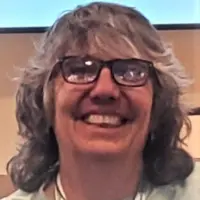
Wanda Fox-Pierre
Program Director
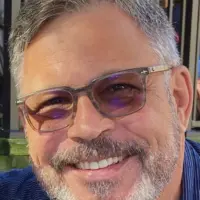
Rob Mayer
Operations Director

Amy Bauer
Clinical Director

Cathryn Mulder
BOD President

Joyce Morrissette
BOD VP
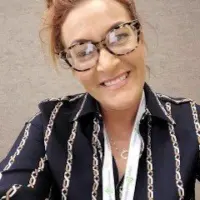
Miranda Merchant
Director of Outreach
Contact Information
31214 Coleman Lane
Spanish Fort AL, 36527